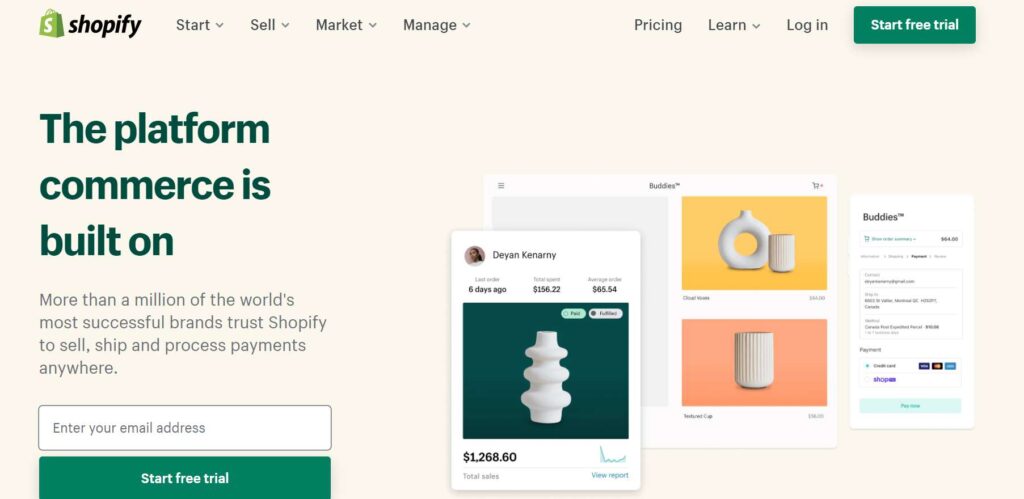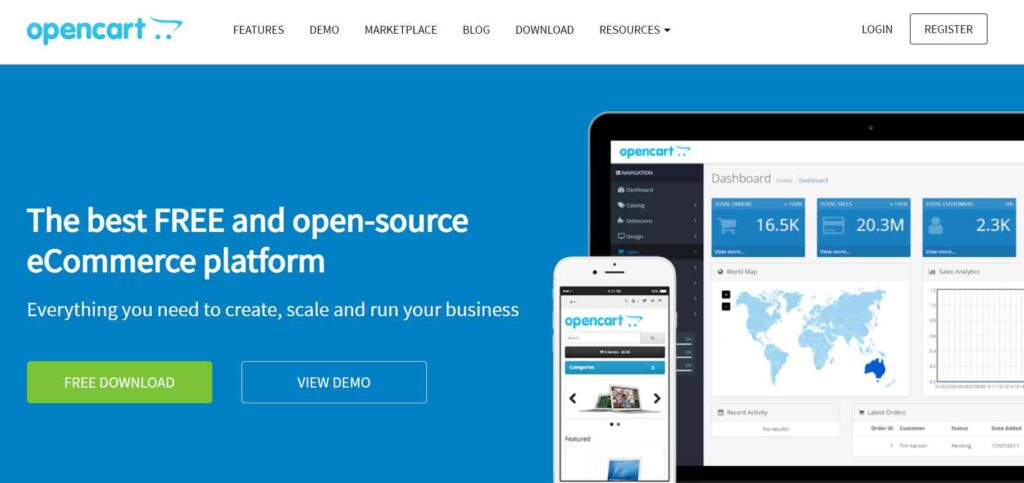Why Do You Need Woocommerce Alternatives For Building Online Stores?
Building an online store with Woocommerce is a popular choice for ecommerce entrepreneurs, but there are some cases where alternatives might be necessary or advantageous. For example, if your store has special needs or requirements, then you may need to find a different platform that can provide the features and functionalities needed to make it successful. Additionally, if you’re looking for a more cost-effective solution, then a Woocommerce alternative might be able to provide you with the same level of service at a lower price.
Ultimately, having multiple options to explore can help you find the perfect platform for your online store.
List of Best Woocommerce Alternatives For Woocommerce To Skyrocket Productivity
1. Ecwid

Pros
- • Easy to Set Up and Use
- • Offers Multiple Payment Options
- • Ability to Integrate with Existing Websites or Create a Stand-Alone Store
- • Support for Multiple Languages and Currencies
- • Intuitive Dashboard with Easy Navigation
- • Comprehensive Online Support Materials
- • Mobile App for iOS and Android
Cons
- • Limited Customization Options for Design and Layout
- • Not Suitable for Large Businesses
- • Transaction Fees Can Add Up Quickly
2. Shopify

Pros
- • Easy to Use and Customizable
- • Secure and Reliable Platform
- • Comprehensive Integrations with Other Services
- • Advanced SEO Tools
- • Affordable Pricing Options
- • 24/7 Customer Support
- • Mobile App for Managing Your Store On-the-Go
- • Ability to Sell Physical, Digital, and Service-Based Products
- • Ability to Create Coupons, Discounts, and Gift Cards
- • Robust Analytics and Reporting Tools.
Cons
- • Transaction Fees on Certain Payment Gateways
- • Limited Design Options for Templates and Themes
- • Shopify’s POS System Requires Additional Investment
- • No Live Chat Support Available
- • Not Ideal for Selling High Volume Items
- • Lack of Bulk Editing Tools
- • Can’t Create Multiple Stores from One Account
3. Magento

Pros
- • Open Source Software Platform
- • Flexible and Scalable
- • Easy to Customize
- • Robust Security Features
- • Strong Community Support
- • Mobile Responsive Templates
- • High Performance
- • Easy to Integrate with Other Systems
- • Multiple Payment Options Available
Cons
- • Complex Setup Process
- • Learning Curve for New Users
- • Limited Documentation for Developers
- • High Hosting Costs for Larger Stores
4. BigCommerce

Pros
- • Low Cost and Flexible Pricing Options
- • Robust Feature Set
- • Easy to Use Interface
- • Responsive Design
- • Integrations with Popular Third-Party Solutions
- • Comprehensive SEO Tools
- • Comprehensive Security Features
- • Ability to Create Custom Themes
- • Excellent Customer Support
Cons
- • Limited Customization Options for Advanced Users
- • Lack of Scalability for Growing Businesses
- • Limited Built-in Payment Processing Options
5. PrestaShop

Pros
- • Easy to customize and use
- • Flexible and powerful ecommerce platform
- • Support for multiple languages and currencies
- • Ability to integrate with other tools and services
- • Ability to set up multiple stores on one platform
- • Comprehensive security features
- • Open source codebase
Cons
- • Limited customer support options
- • Lack of certain features compared to competitors
- • Steep learning curve for beginners
- • Lack of mobile optimization
- • Poor SEO capabilities
6. Wix

Pros
- • Easy to Use Editor with Drag and Drop Features
- • Comprehensive Toolbox of Design Elements
- • Hundreds of Professional Templates
- • Mobile Responsive Websites
- • SEO Friendly Pages
- • Ability to Add E-commerce Functionality
- • Free Hosting and Domain Name
- • Integrated Blogging Platform
- • Integrations with Popular Platforms and Apps
- • In-depth Analytics and Reporting Tools.
Cons
- • Limited Number of Customization Options Compared to Other Platforms
- • Not Suitable for Complex Websites or Those Requiring High Performance or Technical Expertise
- • Unexpected Site Outages or Downtime Occur Occasionally.
7. OpenCart

Pros
- • Easy to use and customize
- • Flexible and user-friendly platform
- • Open source code allows for cost-effective development
- • Wide range of features, including SEO and security features
- • Supports multiple currencies and languages
- • Highly scalable, allowing merchants to grow their business easily
- • Can be integrated with third-party tools to extend functionality
- • Has wide selection of templates to choose from
- • Offers great customer support
Cons
- • Not as popular as other eCommerce platforms, so fewer developers are familiar with it
- • The user interface is a bit outdated
- • Can be slow when there is a high volume of orders
- • Not as many plugins available compared to other platforms
- • Database can get slow if not optimized properly
8. Volusion

Pros
- • Easy to Use Platform
- • Customizable Design
- • Free Online Storefront
- • Excellent Customer Support
- • Variety of Payment Options
- • Flexible Shipping Options
- • Comprehensive Analytics and Reporting Tools
- • One-Stop Shopping Solution for all Online Retailers
- • Optimized for Mobile Shopping Experience
- • Can Automate Business Processes with the Volusion API.
Cons
- • High Cost of Setup and Maintenance Services
- • Limited Add-on Features and Integrations
- • Limited SEO Capabilities
- • No Built-in Inventory Management System
9. Weebly

Pros
- • Easy to Use and Setup
- • Flexible Customization Options
- • SEO Friendly
- • Numerous Themes and App Integrations
- • Reliable Hosting Services
- • Comprehensive Customer Support
Cons
- • Limited Design Customization Options
- • Limited Functionality Without Paid Subscription
- • Poor Mobile Optimization on Some Themes
- • Difficulty With Embedding Third-Party Widgets
10. Squarespace
Pros
- • Easy to Use Interface
- • Customizable Design Options
- • Responsive Templates for Mobile and Desktop
- • Drag-and-Drop Editing Capabilities
- • SEO Optimization Tools
- • Ability to Integrate Social Media Networks
- • Ability to Create Blogs and Online Stores
- • 24/7 Customer Support
- • Affordable Pricing Plans
Cons
- • Limited Third-Party App Integration
- • Limited Design Flexibility with Templates
- • Limited Analytics and Reporting Options
- • Slow Load Times on Some Sites Due to Heavy Image Usage
- • No Free Plan Option
Why Do Small Businesses Need Alternatives To Woocommerce?

Small businesses are increasingly turning to alternatives to Woocommerce due to its complexity and high cost. There are numerous alternatives that offer a more streamlined and cost-effective solution for small business owners.
These alternatives allow businesses to create powerful, dynamic e-commerce stores with features such as secure payment processing, easy product management, and customer loyalty programs.
Furthermore, many of these alternatives offer attractive pricing models, allowing businesses to get started quickly and easily. By taking advantage of these alternatives, small businesses can save time and money while creating a robust e-commerce store.
Woocommerce vs Shopify Comparison

Woocommerce vs Shopify Comparison is an important topic for many business owners looking to establish an online presence. Woocommerce offers a free, open-source platform that allows users to customize their store as they wish. This makes it ideal for those looking to create a unique store with custom features.
Shopify, on the other hand, is a hosted solution that offers a wide range of features and tools to help businesses create and manage their online store. While Shopify is more expensive than Woocommerce, it offers a more comprehensive suite of features and tools.
Both platforms offer a range of payment options, but Shopify is more widely accepted and offers more payment options. Additionally, Shopify offers better customer support and more third-party integrations.
Woocommerce vs Bigcommerce Comparison

When it comes to comparing Woocommerce vs Bigcommerce, both offer a wide range of features and benefits to help businesses manage their online stores. Woocommerce is an open-source platform that is free to use and allows for a great deal of customization.
It is also easy to use and has a large selection of plugins and themes to choose from. Bigcommerce, on the other hand, is a hosted platform that is more expensive but offers more features and better customer support.
Bigcommerce also has a larger selection of themes and plugins, as well as more advanced features such as abandoned cart recovery and real-time shipping. Both platforms offer features such as product management, payment processing, and inventory management, so it really comes down to what features you really want to have in your tool.
Woocommerce vs Magento Comparison

Woocommerce vs Magento is an important comparison to consider when deciding which e-commerce platform to use for your online store. Woocommerce is a free, open source plugin for WordPress that provides a comprehensive set of features for creating an online store. It offers a wide variety of payment options, product and inventory management, and shipping options.
On the other hand, Magento is a powerful, enterprise-level e-commerce platform with a wide range of features and customization options. It is more expensive than Woocommerce, but it is also more powerful and flexible. Both platforms offer a variety of features and benefits, so it is important to consider your business needs and budget before making a decision. In the end, the best platform for your store can be selected based on features you want to have.
Woocommerce vs Ecwid Comparison

When it comes to Woocommerce vs Ecwid, both platforms offer a variety of features and capabilities for businesses to build an online store. Woocommerce is an open source plugin for WordPress that is used to create a fully functional e-commerce store. It offers a wide range of features, including product management, payment processing, shipping and tax options, and more.
Ecwid, on the other hand, is a cloud-based e-commerce platform that is designed to be used with any website. It is easy to set up and manage, and offers many features, such as product management, payment processing, shipping and tax options, and more.
Both platforms offer a wide range of features and capabilities for businesses, but Woocommerce is most favourable for small business owners.
Woocommerce vs Opencart Comparison

When it comes to comparing Woocommerce vs Opencart, there are several important factors to consider. Woocommerce is a WordPress plugin, which makes it easy to set up and use. It also offers a wide range of customization options, allowing users to create a unique online store.
Opencart, on the other hand, is an open source e-commerce platform with a wide range of features, including a built-in shopping cart and payment gateway.
Opencart also allows users to easily add products and manage orders. Both platforms offer different levels of customization, but Woocommerce is more user-friendly. Additionally, Woocommerce offers a wide range of plugins and integrations, making it easier to connect to third-party services.
Woocommerce vs Wix Comparison

Woocommerce and Wix are two popular eCommerce platforms that offer different features and capabilities. Woocommerce is an open-source platform that is hosted on WordPress and offers a wide range of features, including product management, payment processing, and customization options.
Wix, on the other hand, is a proprietary platform that provides an easy-to-use drag-and-drop website builder with built-in eCommerce features.
When comparing Woocommerce vs Wix, it is important to consider the differences in features, pricing, and usability. Woocommerce is more powerful and customizable, but also requires more technical knowledge to set up and maintain. Wix is easier to use and more affordable, but its features are more limited.
Woocommerce vs Squarespace Comparison

Woocommerce vs Squarespace is a comparison of two popular eCommerce platforms. Woocommerce is an open-source platform that is free to use and is used by millions of online stores. It is highly customizable and provides a wide range of features including payment processing, inventory management, and shipping options.
Squarespace is a subscription-based platform with a wide range of templates and tools for creating an online store. It is user-friendly and provides a variety of features such as drag-and-drop interfaces and product customization.
Both platforms offer a range of features and tools for creating an online store, but Woocommerce is more customizable and allows for more control over the look and feel of the store. Squarespace is more suitable for large enterprises.
Why You Have To Choose Woocommerce Subscriptions Alternatives That Will Boost Your Business?

Choosing the right e-commerce platform for your business is critical to success. Woocommerce Subscriptions Alternatives offer a range of features that can help boost your business, such as user friendly checkout processes, secure payment options, and flexible pricing structures. With a variety of features, Woocommerce Subscriptions Alternatives provide an effective and efficient way to manage your online store. By choosing the right alternative, you can ensure that your business runs smoothly and meets customer demands.
- Gulf Shores Getaway: 25 Exciting Things to Do and See in Alabama’s Hidden Coastal Gem! - May 31, 2023
- Lexington, KY: 25 Things to Do and See in the Horse Capital of the World! - May 29, 2023
- Atlantic City Adventures: 25 Things to Do and See in the Entertainment Capital of the Jersey Shore! - May 27, 2023

